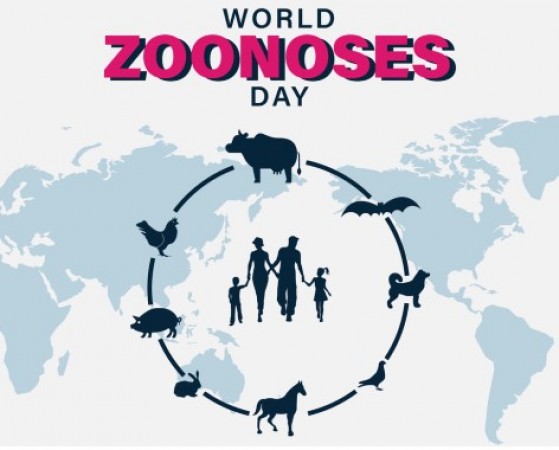
World Zoonosis Day is observed on July 6th each year to raise awareness about zoonotic diseases and their impact on human and animal health. Zoonotic diseases are infectious diseases that can be transmitted between animals and humans. They represent a significant global health challenge, affecting millions of people and animals worldwide. On this day in 1885, Pasteur administered the inaugural rabies vaccine, marking a significant milestone in zoonotic disease prevention. The observance of World Zoonoses Day serves as a platform to raise awareness about different zoonotic diseases and educate people about preventive measures.
This article explores the World Zoonosis Day, history and significance, theme, diseases, measures.
History and Significance of Zoonoses Day 2023
The term “Zoonoses” originates from Greek, where “Zoon” means animal and “Noses” means sickness. Humans have a longstanding relationship with animals, whether it be for hunting or keeping them as pets. In earlier times, the spread of epidemics and diseases was less frequent. However, with the population explosion and increased connectivity among people, diseases and epidemics now have the potential to spread rapidly. Many of the diseases we know today initially started as zoonotic diseases, such as measles, smallpox, and influenza.
Since 1885, World Zoonoses Day has been observed worldwide on July 6th. The primary objective of this day is to raise awareness about the risks associated with zoonotic diseases.Zoonotic diseases have a tendency to spread quickly, which emphasizes the importance of spreading awareness. It is crucial for people to understand the history and causes of these diseases in order to be aware of their potential dangers. In our everyday lives, humans come into contact with animals such as cattle, sheep, pigs, poultry, and dogs. However, individuals, including both the general public and veterinary professionals, are often unaware of the infections that these animals may carry. Therefore, it is essential for people to educate themselves about the necessary safety measures to be taken in such situations.
Theme of Zoonose Day
This year's theme emphasizes the urgency of breaking the chain of zoonotic transmission to prevent future pandemics like COVID-19. The focus is on raising awareness and taking preventive actions at both individual and governmental levels. Tightening food safety laws to prevent disease transmission through food is one such measure governments can implement. can contribute by understanding zoonotic diseases, their causes, and effects to protect themselves and their loved ones.
Zoonotic Diseases
Zoonotic diseases are illnesses that can be transmitted from animals or insects to humans. While some infections may not harm the animals, they can cause sickness in humans. These diseases can range from minor, short-term ailments to severe, life-altering conditions. It has been reported that approximately 60% of human infections originate from animals or insects.Zoonotic diseases can be caused by various sources, including viruses, bacteria, fungi, or parasites that are capable of crossing from animals or insects to humans. Throughout history, numerous zoonotic diseases have affected humans. A prominent recent example is the COVID-19 pandemic, which is believed to have originated from a virus transmitted by bats, according to the current available and accepted information.
Some preventive measures individuals can take:
1) Wash your hands regularly, especially before eating. This helps remove potential pathogens from your hands.
2) Keep mosquitoes, flies, fleas, and ticks away. Adopting hygienic habits, such as keeping your house clean and using insect repellents, can help prevent their presence.
3) Practice safe food handling habits. Wash fruits, vegetables, and grains before consuming them, and ensure that cooked food is always covered to prevent contamination.
4) Maintain a safe distance from animals. If you have pets, pay attention to their hygiene by regularly grooming them and keeping their living areas clean.
World Zoonosis Day serves as a reminder of the critical importance of preventing and controlling zoonotic diseases. With the increasing interconnectedness between humans, animals, and the environment, addressing zoonoses requires a collaborative and multidisciplinary approach. By strengthening surveillance systems, promoting preventive measures, and raising awareness, we can mitigate the impact of zoonotic diseases on both human and animal health. As individuals, we have a responsibility to adopt good hygiene practices, support vaccination efforts, and advocate for policies that prioritize the health and well-being of all living beings. Let us use World Zoonosis Day as a platform to educate, inspire, and take collective action to safeguard the health of our planet and its inhabitants.
Today is a very good day for these zodiac signs, know your horoscope
The Fascinating History and Evolution of Artificial Intelligence